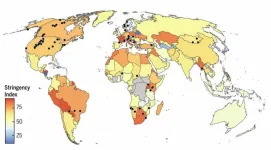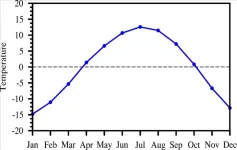(Press-News.org) Key Takeaways
Researchers developed a new 3D model of Alzheimer’s Disease that allows them to study the role of immune cells in the disease
They found that infiltration of immune cells significantly increases in brains with AD pathology and contributes to neurodegeneration and neuroinflammation
The team also identified potential strategies to halt this process, which could lead to the development of new therapies
BOSTON – Cognitive decline associated with Alzheimer’s disease (AD) develops when neurons begin to die, which can be caused by inappropriate immune responses and excessive inflammation in the brain triggered by amyloid beta deposits and tau tangles, two hallmarks of the disease.
Also, immune cells outside of the brain, particularly T cells, can enter the brain and worsen AD pathology, but studying this process has been difficult.
Now, a team led by researchers at Massachusetts General Hospital (MGH) has engineered a novel 3D human cellular model that mimics the intricate interactions between brain cells and these immune invaders.
The work, which builds on previous 3D models of AD developed by the team, is described in Nature Neuroscience.
In the new study, the team used the model to demonstrate that as Alzheimer’s pathology accumulates in the brain, specific types of immune cells called CT8+ T Cells surge into the brain and amplify the destruction caused by neuroinflammation.
The team also identified the molecular mechanisms that drives the infiltration of T cells to the brain and showed that blocking these mechanisms reduced the destructive effects of T cell infiltration.
The findings could lead to new therapies for Alzheimer’s patients that target immune cell infiltration in the brain.
“Enabled by cutting-edge microfluidic technology, this model opens up a window to observe infiltrating peripheral immune cells in action within 3D cell cultures; their interactions with brain cells; and their impact on neuroinflammation and neurodegeneration,” says co-lead author Mehdi Jorfi, PhD, instructor in Neurology at MGH.
“We hope our work contributes to developing a more physiologically relevant human Alzheimer’s disease model in a dish,” adds co–senior author Doo Yeon Kim, PhD, associate professor of Neurology at MGH.
The team’s new model is a 3D human neuroimmune axis model is comprised of stem-cell derived neurons, astrocytes and microglia along with peripheral immune cells.
The model is an extension of previous work done by the research team to create and validate 3D lab models of AD that better replicate the hallmark plaques and tangles of the disease in a three-dimensional environment—much in the same way the disease develops in the brain.
In addition to observing higher levels of T cells in AD brain models, the team identified a pathway between a chemokine (CXCL10) and chemokine receptor (CXCR3) that plays a key role in regulating T cell infiltration.
Blocking this pathway largely prevented T cell infiltration and neurodegeneration in AD cultures.
The findings could help in identifying new therapeutic targets that slow or halt the infiltration of T cells into the brains of Alzheimer’s patients, and potentially reduce the devastating cognitive impacts of the disease.
"his multidisciplinary research approach identified the different behaviors of distinct cell types in this disease context, and we aim to shed light on the underlying mechanisms to identify strategies for intervention that could lead to more effective treatments," said co–lead author Joseph Park, PhD, instructor in Neurology at MGH.
Additional targets may be identified with continued experiments with this model.
“Perhaps, what is most exciting about this study is that we have identified a new drug target on T cells, outside of the brain, which would be more accessible to novel treatments, especially since it has been traditionally difficult to get drugs into the brain,” says senior author Rudolph Tanzi, PhD, director of the Genetics and Aging Research Unit at MGH.
Additional co-authors include Clare K. Hall, Chih-Chung Jerry Lin, Meng Chen, Djuna von Maydell, Jane M. Kruskop, Byunghoon Kang, Younjung Choi, Dmitry Prokopenko, and Daniel Irimia.
This work was supported by the Cure Alzheimer’s Fund and the JPB Foundation.
About the Massachusetts General Hospital
Massachusetts General Hospital, founded in 1811, is the original and largest teaching hospital of Harvard Medical School. The Mass General Research Institute conducts the largest hospital-based research program in the nation, with annual research operations of more than $1 billion and comprises more than 9,500 researchers working across more than 30 institutes, centers and departments. In July 2022, Mass General was named #8 in the U.S. News & World Report list of "America’s Best Hospitals." MGH is a founding member of the Mass General Brigham healthcare system.
END
New human cell-based 3D model reveals insights into how immune cells contribute to Alzheimer’s disease
The model provides insights into the progression of AD and could help to accelerate the testing of new treatments
2023-08-25
ELSE PRESS RELEASES FROM THIS DATE:
Spending on mental health services has risen by more than 50% since beginning of pandemic
2023-08-25
Spending on mental health services among Americans with private health insurance has surged since the beginning of the COVID-19 pandemic, continuing to rise even as the use of telehealth has plateaued, according to a new study.
Spending on mental health services rose by 53% from March 2020 to August 2022 among a large group of people with employer-provided insurance, according to researchers from the RAND Corporation and Castlight Health. During the same period, use of mental health services increased by 39%.
The researchers say it is uncertain if the trend will continue since some rules that expanded payment for telehealth ...
Patient experiences with hospitals worsened during first two years of pandemic
2023-08-25
The experiences of patients hospitalized during the COVID-19 pandemic was significantly worse than in the years before the crisis, with hospitals with higher staffing levels holding on to better scores longer, according to a new RAND Corporation study.
Patients particularly reported worse staff responsiveness and hospital cleanliness, possibly reflecting staffing shortages in the hospital workforce and the effects of protocols needed to limit the spread of COVID-19, according to researchers.
Deficits were largest for hospitals that in the pre-pandemic period were lower-performing and had lower staffing levels. ...
Changes in patient experiences of hospital care during the pandemic
2023-08-25
About The Study: The results of this study suggest that higher-staffed and higher-performing hospitals were more resilient to the conditions of the COVID-19 pandemic, but by late 2021, patients’ experience of care had declined in all hospitals.
Authors: Marc N. Elliott, Ph.D., of the RAND Corporation in Santa Monica, California, is the corresponding author.
To access the embargoed study: Visit our For The Media website at this link https://media.jamanetwork.com/
(doi:10.1001/jamahealthforum.2023.2766)
Editor’s Note: Please see the article for additional information, including other authors, author contributions ...
COVID-19 pandemic and associated inequities in heart attack treatment, outcomes
2023-08-25
About The Study: This study found that while the pandemic was associated with worse treatment and outcomes in patients with acute myocardial infarction (AMI; heart attack), race and ethnicity–associated inequities did not increase significantly. These findings suggest the need for additional efforts to mitigate outcomes associated with the COVID-19 pandemic for patients admitted with AMI when the hospital COVID-19 burden is substantially increased.
Authors: Laurent G. Glance, M.D., of the University of Rochester ...
Tides may be responsible for up to 69% of under-ice melting in an Antarctica ice shelf
2023-08-25
The ice shelves — the marine-terminating glaciers of the Antarctic Ice Sheet — are melting, and it's not just because of rising atmospheric temperatures. In a one-two punch, ice shelves in Antarctica are fighting a losing battle against rising temperatures both at the surface and under their body. Called basal melting, oceanic heat and compression contribute to the phenomenon, but tides may play a bigger role than previously thought, according to a multi-institution research collaboration based in China. Based on observational data in Prydz Bay, which ...
PolyU scholar’s transformative work on the Leidenfrost effect wins the Falling Walls Science Breakthroughs of the Year 2023
2023-08-25
Prof. Zuankai WANG, Associate Vice President (Research and Innovation) and Chair Professor of Nature-Inspired Engineering at The Hong Kong Polytechnic University (PolyU) has been bestowed one of the 10 winners of the Falling Walls Science Breakthroughs of the Year 2023 in Engineering and Technology category for his groundbreaking work on resolving the Leidenfrost effect.
The Award aims to foster research and innovation across all disciplines by celebrating cutting-edge discoveries. The Falling Walls Foundation, based in Berlin, established the Award to acknowledge the most recent breakthroughs in science and society worldwide.
Prof. WANG’s ...
Half as many AF patients dying of heart attacks and strokes in the UK
2023-08-25
University of Leeds news
Embargo: 25 August 2023, 12.30pm CEST
Patients living with one of the UK’s most common heart rhythm conditions are 50% less likely to die from a heart attack or stroke than they were at the start of the millennium, new research has found.
Analysis of the health records of more than 70,000 patients newly diagnosed with atrial fibrillation (AF) showed that mortality from related cardiovascular and cerebrovascular diseases more than halved over the 16-year study period.
AF is associated with an increased risk of stroke.
The research showed that dementia ...
The corona lockdowns changed the behavior of wild animals around the world
2023-08-25
In the spring of 2020, one country after another went into lockdown as Covid-19 spread across the globe. In some places, e.g. China, the civilian population was kept inside by the authorities. Other countries, like Spain, had a curfew in place for weeks, during which only short trips to the supermarket were allowed.
The lockdowns meant there were suddenly much fewer cars on the roads and people in forests and parks. While we were sitting at home watching Netflix, wild animals emerged from the bushes and edges of the forest. They ventured closer to the roads and cities that had suddenly emptied.
We know this thanks to data from GPS trackers attached to a large number of terrestrial ...
Starch discovery reaps benefits for brewing, baking and milling industries
2023-08-25
Research has brought clarity to the longstanding question of how starch granules form in the seeds of Triticeae crops – wheat, barley, and rye - unlocking diverse potential benefits for numerous industries and for human health.
Starch in wheat, maize, rice and potatoes is a vital energy-giving part of our diet and a key ingredient in many industrial applications from brewing and baking to the production of paper, glue, textiles, and construction materials.
Starch granules of different crops vary greatly in size and shape. Wheat starch (and those of other Triticeae) uniquely have two distinct types of granules: large A-type granules and smaller B-type granules.
The ratio ...
Insights from past warming: Enhanced temperature seasonality in China during the mid-Holocene
2023-08-25
Against the background of global warming, the temperature seasonality has changed obviously at global and regional scales, which has exerted significant ecological and societal impacts. As a populous country highly sensitive to climate change, China experienced an overall decreasing trend of the amplitude of the annual temperature cycle during 1961–2007. This national-scale average downward trend is likely to continue throughout the rest of the 21st century according to future projections, with a spatially robust decrease in most regions but increases at more local scales. ...
LAST 30 PRESS RELEASES:
Gut microbiome connected with heart disease precursor
Nitrous oxide, a product of fertilizer use, may harm some soil bacteria
FAU lands $4.5M US Air Force T-1A Jayhawk flight simulator
SimTac: A physics-based simulator for vision-based tactile sensing with biomorphic structures
Preparing students to deal with ‘reality shock’ in the workplace
Researchers develop beating, 3D-printed heart model for surgical practice
Black soldier fly larvae show promise for safe organic waste removal
People with COPD commonly misuse medications
How periodontitis-linked bacteria accelerate osteoporosis-like bone loss through the gut
Understanding how cells take up and use isolated ‘powerhouses’ to restore energy function
Ten-point plan to deliver climate education unveiled by experts
Team led by UC San Diego researchers selected for prestigious global cancer prize
Study: Reported crop yield gains from breeding may be overstated
Stem cells from human baby teeth show promise for treating cerebral palsy
Chimps’ love for crystals could help us understand our own ancestors’ fascination with these stones
Vaginal estrogen therapy not linked to cancer recurrence in survivors of endometrial cancer
How estrogen helps protect women from high blood pressure
Breaking the efficiency barrier: Researchers propose multi-stage solar system to harness the full spectrum
A new name, a new beginning: Building a green energy future together
From algorithms to atoms: How artificial intelligence is accelerating the discovery of next-generation energy materials
Loneliness linked to fear of embarrassment: teen research
New MOH–NUS Fellowship launched to strengthen everyday ethics in Singapore’s healthcare sector
Sungkyunkwan University researchers develop next-generation transparent electrode without rare metal indium
What's going on inside quantum computers?: New method simplifies process tomography
This ancient plant-eater had a twisted jaw and sideways-facing teeth
Jackdaw chicks listen to adults to learn about predators
Toxic algal bloom has taken a heavy toll on mental health
Beyond silicon: SKKU team presents Indium Selenide roadmap for ultra-low-power AI and quantum computing
Sugar comforts newborn babies during painful procedures
Pollen exposure linked to poorer exam results taken at the end of secondary school
[Press-News.org] New human cell-based 3D model reveals insights into how immune cells contribute to Alzheimer’s diseaseThe model provides insights into the progression of AD and could help to accelerate the testing of new treatments




